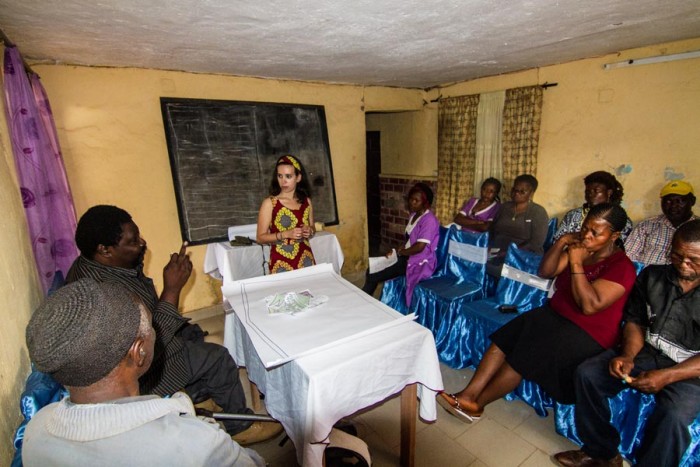April 30th, 2015 by Rachel | Tags: Disability, Health, Malaria, Peace Corps | No Comments »

On Sunday, April 26, I held the very first malaria workshop for persons with disability. I collaborated with Richard, the president of Helping Each Other, a disability related association based in Bamenda. Eleven people attended the workshop, which is a very good number considering how many persons with disability are unable to attend due to transportation barriers.
Before the workshop began, I gave a multiple choice pre-test that included six questions. Then I started the workshop with a game called “Anopheles Says.” This game worked exactly like Simons Says. The difference was that I said “Anopheles,” the name of the mosquito that transmits malaria instead of “Simon.” The purpose of the game was to not only to kick off the workshop in a fun way, but also teach the attendees the importance of listening. After the game was over, I told them that the point of the game was to let them know that they need to listen carefully to the information I would be sharing. Then I taught them what is malaria, how is malaria transmitted, how to prevent it, what are the symptoms and why is malaria an important issue in the disability community. I also taught them the importance of taking what they learned and teaching them in their community of persons with disability and advocating for better health services and support from the government. Then we did an activity where I presented a poster of an outline of a house that I drew and cut outs of items such as a bed with a mosquito net, a bed without a mosquito net, water, dirt, uncut grass, trimmed grass, window with a screen and window without a screen. I asked the participants to show me what a home would look like that would make you vulnerable to malaria and also a home that would help you prevent from becoming ill with malaria. Then I gave a post-test.
According to the results of pre-test and post-test, I saw a modest improvement in the knowledge of malaria. While only seven out of eleven answered correctly on the pre-test, on the post-test, ten answered correctly on the question, “What is malaria.” The one person who did not answer correctly did circle that malaria is a parasite transmuted by mosquitos that causes illnesses but also circled that it is spread through handshaking.
When I asked to circle all the choices that would allow them to prevent getting malaria, nine responded sleeping under the mosquito net, eight responded keeping the home clean, four responded using the bug spray, six responded removing any excess water around outside the home, four responded taking a malaria prophylaxis, and one responded visiting a witchcraft doctor. This means that the attendees did not have the most well-rounded knowledge of the best methods to prevent malaria. On the post-test, six circled all the correct ways to prevent malaria. The rest circled only some of them and interestingly, two actually circled visiting a witchcraft doctor.
For the third question on the pre-test and post-test, “What are the symptoms of malaria?” I included ten different symptoms:
Headache
Fever
Fatigue
Muscular Pain
Back Pain
Chills
Sweating
Dry Cough
Nausea
Vomiting
I asked the participants to circle all that applies. On the pre-test, not one person circled all of the symptoms, as all of the listed symptoms are part of the malaria illness. However, on the post-test, six participants circled all of the symptoms. What is interesting however is that on the pre-test, nine participants did circle fever as one of the symptoms. In Cameroon, when people have fever, it is often assumed that they have malaria.
For the fourth question, “Are persons with disability just as or more vulnerable to malaria than persons without disability?”, while eight participants said, “Yes,” on the post-test, ten participants said, “Yes.”
For the fifth question on the pre-test, six responded that they use a mosquito net while sleeping at night. Those who said no said it was because they didn’t have a mosquito net and/or they had no money for it. One wrote in that it was only because he feels claustrophobic when sleeping with the mosquito net. On the post-test, I asked if they would now consider using the mosquito net and ten said, “Yes.” The only person who said, “No” is the same person who said that he will not use the mosquito net because he feels too claustrophobic under the net.
On the pre-test, for the last question, “Do you have access to malaria medication?” all except for one person has no access to medications. The reason is because they have no money to purchase the medicine. On the post-test, I asked, “After attending the workshop, will you now get medication for malaria?”, seven responded that they will get medication if they do become ill with malaria but many of them also circled that they still have no money for it.
At the end of the workshop, the participants expressed how much they enjoyed it. One woman stood up and said that if she had known that the workshop would be well-done, she would have brought a group of female widows with whom she works to the workshop. When I told them that I would like to do an HIV/AIDS workshop for them in June or July, they asked if it was possible to do it sooner and told me what they would like to learn more about relating to HIV/AIDS. I will be conducting three more malaria workshops during the month of May and June to reach out to more persons with disability. Stay tuned for additional reports from the upcoming workshops.
